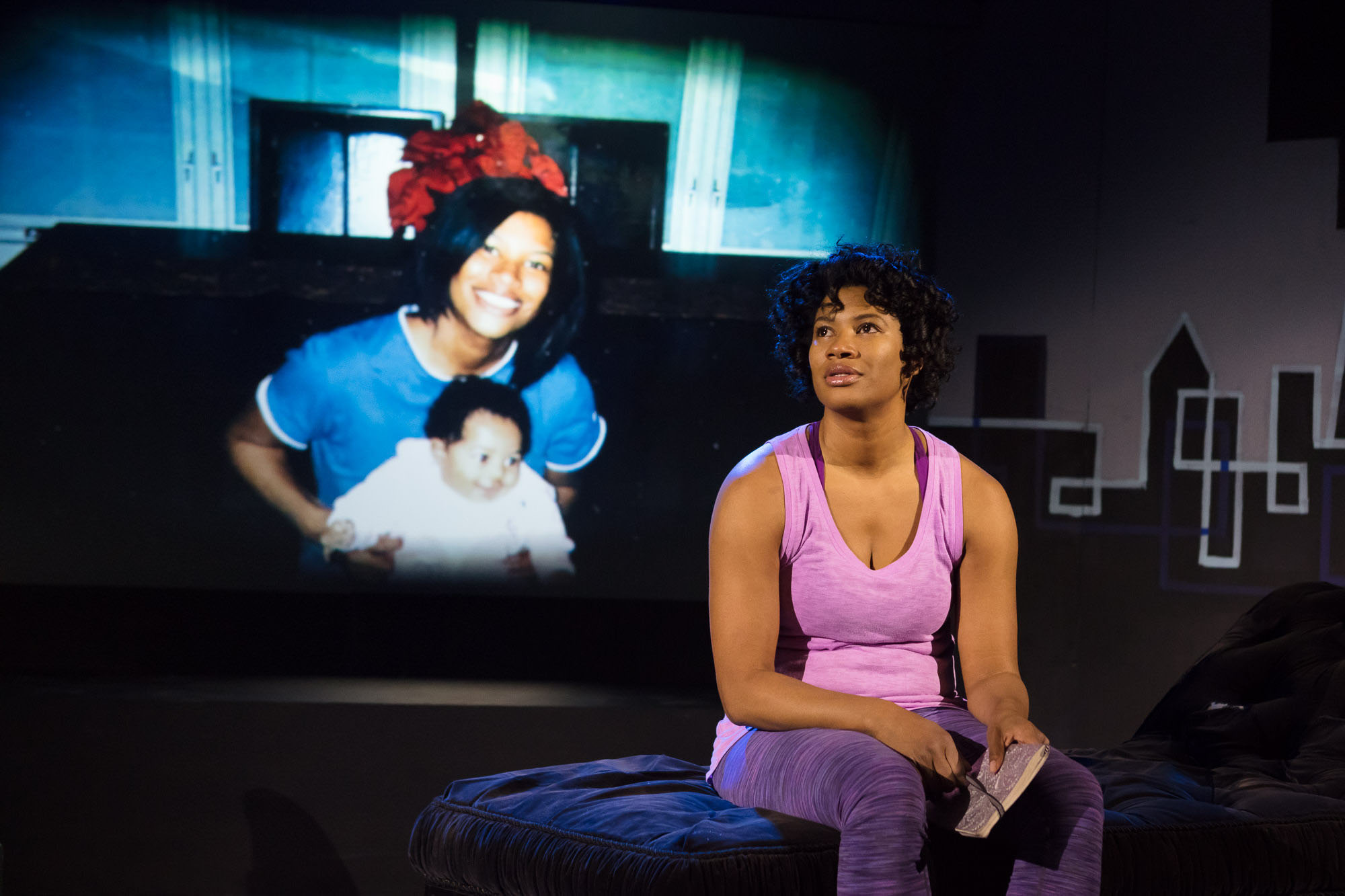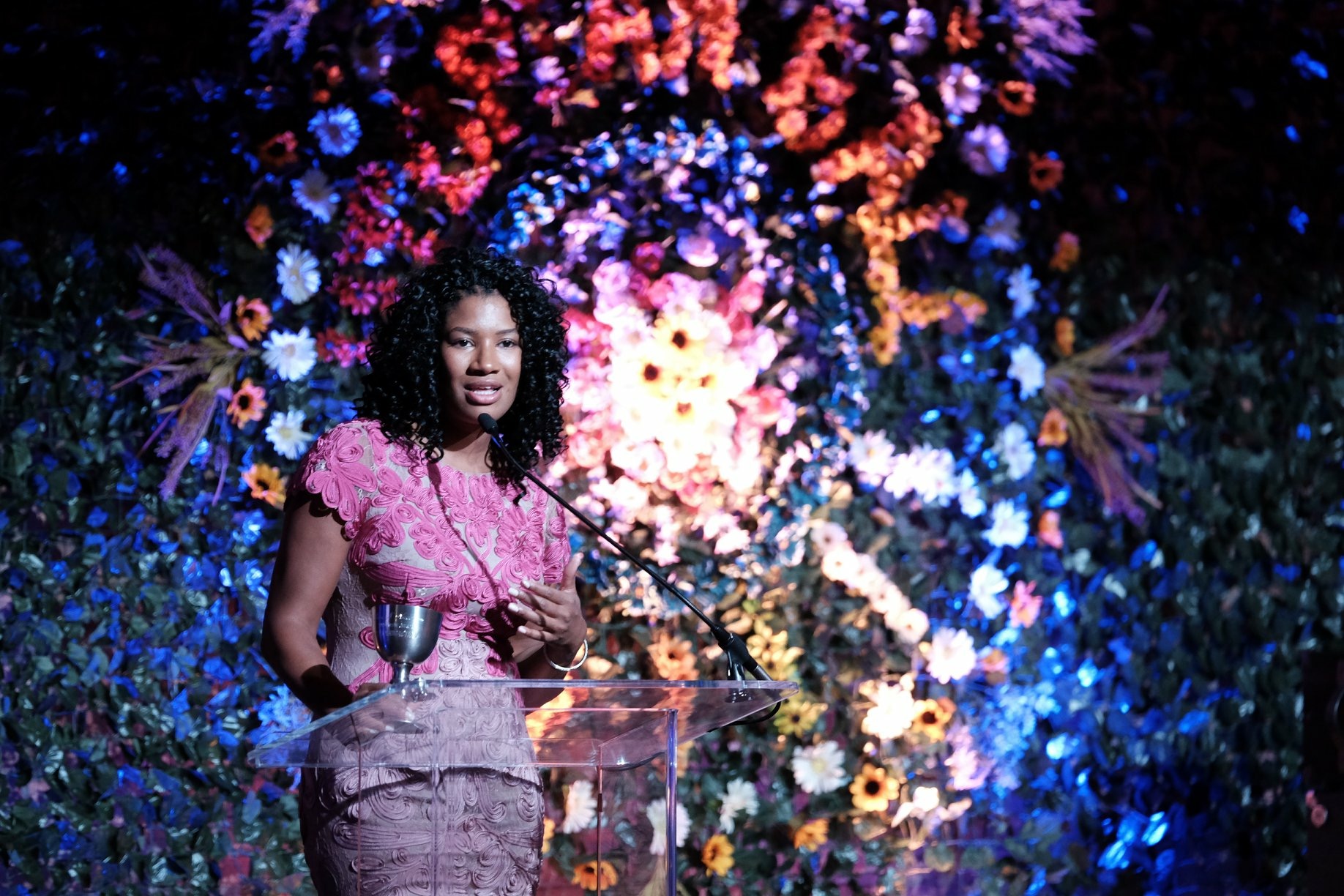Dana N. Anderson is a Chicago-based performing artist and writer. Her experience spans on-camera, stage, voiceover and dance. She is a member of SAG-AFTRA and a frequent contributor at Collaboraction Theatre.
In early 2018 Anderson wrote and performed her first theatre production, Soul in Suburbia, a short play about Chicago land as seen through the lens of a Black family settling in the suburbs circa 1980. The short play debuted as part of Collaboraction’s Encounter Series and was directed by actor/writer Sandra Delgado of La Havana Madrid fame.
N’DIGO recently sat down with Anderson on the cusp of the premiere of her now full-length version of Soul In Suburbia to get more insight on the heavily buzzed about production.
(Catch performances of Soul In Suburbia on Thursday, January 17 at 7:30 p.m., Thursday, January 24 at 7:30 p.m., and Saturday, January 26 at 9:30 p.m. as part of Collaboration’s Encounter festival.
All Encounter programs will be presented at Collaboraction, 1579 North Milwaukee Avenue, 3rd Floor, in Chicago’s Wicker Park neighborhood.)
N’DIGO: In your own words, tell us who is Dana N. Anderson.
Dana Anderson: She is a bold, courageous woman. She is a mover, a very determined and intuitive individual with an immense amount of love, creativity and power in her spirit.

What did you dream of being as a child? Did you always know you’d go into art and entertainment?
When I was a child, I wanted to be EVERYTHING creative. In preschool, I drew a picture of myself on a throne wearing a tutu and pointe shoes and wrote, “When I grow up, I want to be queen.” I have always known that artists are royalty and always had the desire to go into art and entertainment. I dreamed of being an Alvin Ailey dancer, a visual artist, a fashion designer. I never really envisioned myself working a 9 to 5 type of career.
Tell us about your play, Soul In Suburbia.
The play in its original production was about 22 minutes and is framed up as a Black woman forced to go to anger management therapy in order to keep her job. I share these stories as part of a therapy session, which was important for me to use as a framing device.
I believe that if Black people weren’t afraid to face mental health and took the time to deal with some of the trauma we face due to our history of oppression, we could be a healthier community across the board.
I chose the name as a throwback to my parents and their friends. “Soul in Suburbia” was a social club they formed to give Black families the opportunity to connect in the Northwest suburbs of Chicago. We had parties, events, a Black Santa Claus.
They kept it real and didn’t worry about trying to force their way into places where they weren’t wanted. That made us very proud to be Black in an environment that often told us that being Black meant we weren’t “enough.”
It’s one thing to write a play, but can you explain the process of having to expand what was originally a short play into a full-length version?
Expanding the play has been the best part of all of this. I’m learning and stretching in ways I never really imagined. The first time around I had two women I trust, Sandra Delgado as the director and Eva Saha as my scene partner (the therapist). This time I’ve had to rely on a team. So much of this is new to me and I have had to be vulnerable enough to involve multiple people from the crappy first draft to the finish line.
I have a new director – a young, ambitious, driven sister named Shawntia Grant. A dramaturg, Dr. Karen Jean Martinson. New actors. And of course, Collaboraction’s amazing stage management and production team. They are so creative and so skilled. What I see in my dreams, they have the ability to execute. The production value has only increased with this expansion and I am over the top excited!


How exactly did Soul in Suburbia come to be?
Soul in Suburbia came about because a dear friend of mine, Anthony Moseley, shared with me that his theatre company, Collaboraction, was starting a new festival focused on new works about racism in Chicago. He was doing research and getting ready to open up the fest for submissions.
I jokingly told him, “You should hear the stories about my family’s experiences out in the burbs of Chicago.” He asked to interview, but we never could catch up. Upon his encouragement, I started dictating and writing out stories from my encounters with racism from elementary through high school.
When I got going, I found it amazing how much I could remember. Names and features of bullies, their family details, ignorant teachers, songs that were popular at the time. I had buried all these unpleasant memories…because as Black people, we just deal with those experiences and keep it moving. We don’t have time to dwell on the effects of racism. We just know we will continue to face racism.
What, if anything, do you want people to take away from the play after seeing it?
I want the audience to take away a few things. Black people aren’t born angry. The next time you want to stereotype an angry Black woman, take a step back. We are walking around hurting. Sometimes we’re just so damn TIRED. Consider how you are contributing to that or what you can do to support us.
Mental health matters. One can and should only take so much. Face your demons, deal with your past, share your feelings, fully process your pain. THAT is how you push through. Great theatre doesn’t have to be cookie cutter from stories you already know at a big name theatre.
Sure, I love to escape and be entertained and I’m not knocking that trip to the theatre. But actors are pouring their hearts out and sharing their naked truths on stages that may go unnoticed because they haven’t landed the big money. I want people to leave our little theatre saying, “Wow. That show was amazing!”
Not just because of the honest, powerful performances, but also the high production value they did not expect at a smaller house. With Soul in Suburbia, I’ve used video projection, intricate lighting cues, sound design and great music to create a show with remarkable texture. We don’t play around at Collaboraction!
What can you tell us about Collaboraction and it’s upcoming Encounter Series?
Collaboraction is a collective of artists, community activists, and citizens that utilize theater to cultivate dialogue and action around our most critical social issues throughout Chicago. They have worked with over 3,000 artists to bring more than 60 productions and events to upwards of a quarter of a million audience members.
The Encounter Series is a two-week winter festival of theater, dance and spoken word curated around the themes of equity and inclusion, which runs January 15-27 this month. Encounter consists of six programs: three new full-length works, two programs of mid-length pieces, and one short-works collection, each devised and performed by Chicago artists working in a variety of media, all intended to incite knowledge, discussion and action.
Do you have specific pre-show routine or ritual that you must do before every performance?
Music is everything to me. I have to hear something I love so I can dance and warm up my vocals. Get loose; act silly. Sometimes I burn palo santo. Then I talk to God and call it DONE in excellence.

If you had to name a single book that changed or really impacted your life, what would it be?
Tough to choose a single book that impacted me most. I’ll say The Autobiography of Malcolm X because I can recall being drawn to his story of transformation and personal power. And I remember presenting the book in my freshman year high school English class. I felt like a boss dropping that knowledge on my white classmates.
What’s something people would be surprised to know about you?
People might be surprised by my broad taste in music. When I cook, clean or write, I will play anything – ATCQ and Wu-Tang to Jack White and Queens of the Stone Age to Tears for Fears and Wham! to Prince & MJ. My neighbors love me the most when I play trap. LOUD.
Best advice to young Black women?
We are the most powerful creatures on this big, beautiful planet, so take care of your mind, body and heart. Do not give your power away too easily. The world needs us at our best. This is a big, wonderful world. Set your goals as lofty as your dreams, with the intention to go spread your magic in far away places someday. Keep pushing.
Favorite quote or affirmation?
My favorite quote is from Viola Davis: “As Black women, we’re always given these seemingly devastating experiences, experiences that could absolutely break us. But what the caterpillar calls the end of the world, the master calls the butterfly. What we do as Black women is take the worst situations and create from that point.”
My favorite scripture is Hebrews 11:1, which says, “Faith is the substance of things hoped for, the evidence of things not seen.”
What’s next for Dana N. Anderson?
I’ve adapted the Soul in Suburbia script for digital media, as an episodic. I won’t say much more about that. I’m just seeing that I have the power to create great content and the roles I’d like to play may just need to be created by me!
As far as other projects I want to accomplish in the near future, I have a feature film for which I just wrote a treatment; another story very close to home. There’s also a musical set in Harlem that I have wanted to dig into for years. I am in this for the long haul.
An important quote I keep on my vision board is, “It is up to me to always find a way to represent my culture.” I do not know who said that, but I have adopted those words as part of my purpose in this industry.
(For more information, visit www.collaboraction.org.)






